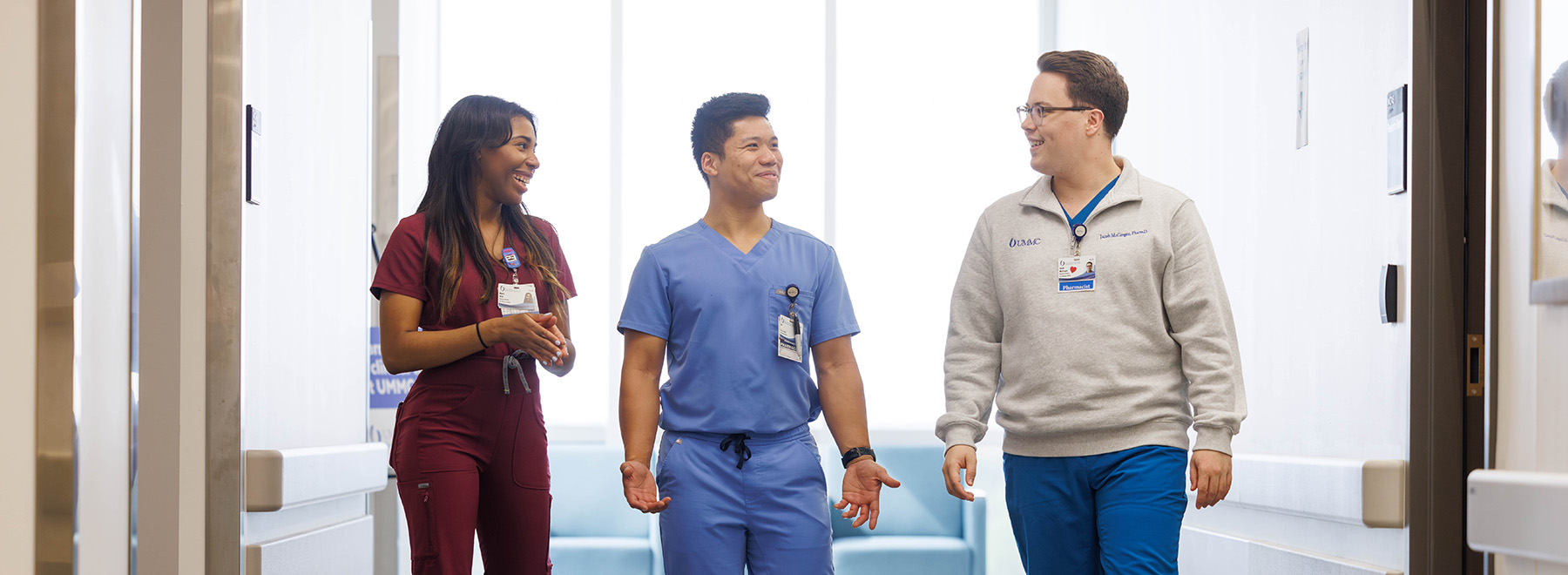
UMMC-based Pharmacy Residencies
UMMC-based Pharmacy Residencies

The University of Mississippi Medical Center is the state's only academic health science center. UMMC includes six health science schools: medicine, nursing, dentistry, health-related professions, graduate studies and population health. We have seven hospitals, more than 30 clinics, and more than 200 telehealth sites statewide. Four of our hospitals are located on the main campus in Jackson, Mississippi.
We are Mississippi's ONLY
- Level I Trauma Center
- Level IV Neonatal Intensive Care Unit
- Children's Hospital
Our Programs
UMMC Department of Pharmacy Practice offers three ASHP-accredited residency programs. Our 12-month programs are designed to allow residents to develop the skills that are necessary to provide confident and competent pharmaceutical care to a variety of patients.
We offer six positions in our PGY1 Pharmacy Residency Program, one position in our PGY2 Critical Care Program, one position in our PGY2 Infectious Diseases Program, and one position in our new PGY2 Pediatric Program!
These residency programs are managed by the UMMC Department of Pharmacy. The University of Mississippi School of Pharmacy operates additional residency programs that can be found here.
Application Quick Facts
Current Residents
Prospective Resident information
Programs/rotations
- PGY-1 Pharmacy
The PGY-1 Pharmacy Residency is a 12-month postgraduate ASHP-accredited program that provides a structured, directed and professional learning experience. The program builds on previous education and experience and is directed toward developing a generalist expert knowledge and skills in pharmacotherapy management. Patient care services include patient education, drug information and direct patient care activities. The program structure allows for a focused approach to the training, particularly in Ambulatory Care, Pediatrics and Critical Care if the resident has an interest in a certain area of practice. UMMC's residency programs instill the philosophy that pharmacists are responsible and accountable for medication therapy outcomes. The program is flexible and allows the resident to pursue individual interests and goals. There will be required learning experiences in each focus selected with a wide variety of electives. - PGY-2 Critical Care
This residency is a 12-month ASHP-accredited post-graduate program designed to develop advanced skills necessary to provide confident and competent pharmaceutical care to critically ill patients and to develop skills necessary to participate in the education of current and future healthcare professionals. The program began in 2014 and continues to build upon numerous opportunities available at UMMC. The residency includes learning experiences in surgical, medical, cardiac and neuroscience intensive care and other related specialties. - PGY-2 Infectious Diseases
This residency is a 12-month ASHP-accredited postgraduate program that builds upon the experiences in a PGY-1 residency with a focus in infectious diseases. The resident will maintain an active practice in the Department of Medicine, Division of Infectious Diseases. Patient care services will be provided for both inpatient and outpatient clients to ensure continuity of care. - PGY-2 Pediatric
The PGY-2 Pediatric residency is a new 12-month postgraduate program offered at UMMC as of 2024. The program will allow residents to build on foundational knowledge from Doctor of Pharmacy (PharmD) education and PGY-1 pharmacy residency experiences to develop specialized skills in the area of pediatric pharmacy. The resident will function independently as a member of interdisciplinary healthcare teams while optimizing and advancing pharmaceutical care for pediatric patients.
The resident will work closely with the program director who will coordinate practice and research activities, monitor progress and mentor the resident.
Additional pharmacy residency programs are offered by the University of Mississippi School of Pharmacy.



